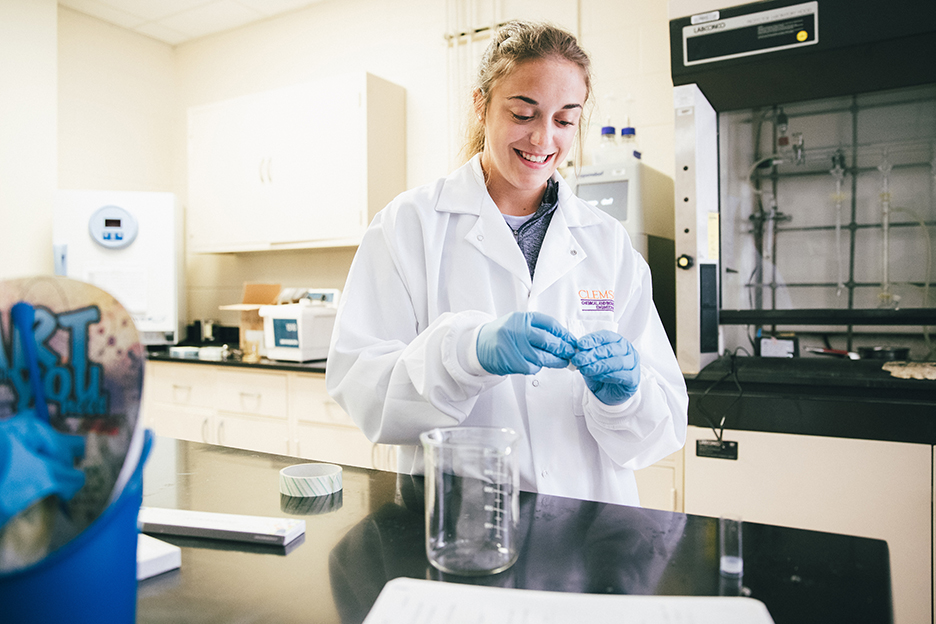Researcher studies people’s perceptions of ‘silver lining’ to COVID-19
In the midst of a global pandemic that negatively affected nearly everyone in some way, people were still able to identify some positive outcomes—a “silver lining”—in the situation.
These are the findings of Clemson University researchers who studied the reactions of individuals to COVID-19 in the early stages of the pandemic. The researchers also reported that the majority of respondents felt that even when things were arguably at their worst, people tended to reflect on and value similar aspects of their “new normal.”
The research was conducted by Robin Kowalski, professor in Clemson University Department of Psychology, and undergraduate students as part of Creative Inquiry, a University-wide program that engages students in research activities. Kowalski and students Hailey Carroll and Jordan Britt answered a call for COVID-related research put out by Creative Inquiry as part of the program’s COVID Challenge.
“Benefit finding has always interested me, so we decided to see if people were experiencing or imagined they would experience some form of post-traumatic growth related to the pandemic,” Kowalski said. “This study’s results were interesting because we were asking people to reflect on positive things in a negative situation. At the time we collected data, we were really asking people to shift their thinking substantially.”
The researchers collected data in June and July of 2020, with respondents only three months into the pandemic. The researchers asked participants to report their level of satisfaction in work, leisure, fitness, mental health, finances and other areas during three points: currently, six months prior to the study and their projected satisfaction six months later.
An overwhelming majority of participants listed “more time with family and friends” as a primary benefit of COVID-19. They also reported more satisfaction with family at the time of the study compared to six months beforehand and projected even more satisfaction six months later.
This measure stood out, but on other measures including spirituality, mental health and fitness, respondents indicated that their satisfaction would at least return to their baseline levels once the pandemic was over or once the pandemic’s effects lessened. Most respondents did not believe that the world would still be feeling the effects of the pandemic well into 2021. Kowalski said this is significant because it revealed that benefit finding didn’t correlate with optimism.
“For everyone who experienced loss during the pandemic, large or small, it was still a time to reflect or reframe, and there’s real benefit in that.”
ROBIN KOWALSKI
“The reason we think people were always focused on things just getting back to normal is because when a person is optimistic, they’re looking into the future; benefit finding is more in the moment,” Kowalski said. “Participants couldn’t see an end. Things were ambiguous, so this suggests that it was hard for participants to find meaning in the future.”
Kowalski and the student researchers also asked participants to report advice that they would have given their pre-COVID self, a variation on a similar research study Kowalski conducted in 2019. Mental preparation and an increased focus on overall health were the most common areas that participants reported as important in this measure, reflecting a “lessons learned” mentality among participants. Other measures that were commonly reported revolved around stocking up on supplies and saving money to prepare for unforeseen financial issues.
Kowalski infers that the 179 final participants experienced a wide array of effects from the pandemic, although researchers did not solicit responses about how COVID-19 affected them specifically or to what degree.
Kowalski acknowledges that the scope of loss differed so much from person to person—for every single person barely affected there is another who lost a job, a home or a loved one. However, she said that despite the vast continuum that exists between inconvenience and staggering loss, people tend to still manage to find meaning or even a benefit, however hidden.
“It’s the concept of hedonic adaptation: in general, people who experience trauma—even trauma that would make someone imagine their life was forever ruined—tend to return to a baseline of happiness,” Kowalski said. “For everyone who experienced loss during the pandemic, large or small, it was still a time to reflect or reframe, and there’s real benefit in that. I think this study showed that most people tended to get that reflection out of the experience and there were several common aspects on which they focused.”
The Department of Psychology is part of the University’s College of Behavioral, Social and Health Sciences (CBSHS). Established in July 2016, CBSHS is a 21st-century, land-grant college that combines work in seven disciplines – communication; nursing; parks, recreation and tourism management; political science; psychology; public health sciences; sociology, anthropology and criminal justice – to further its mission of “building people and communities” in South Carolina and beyond.

